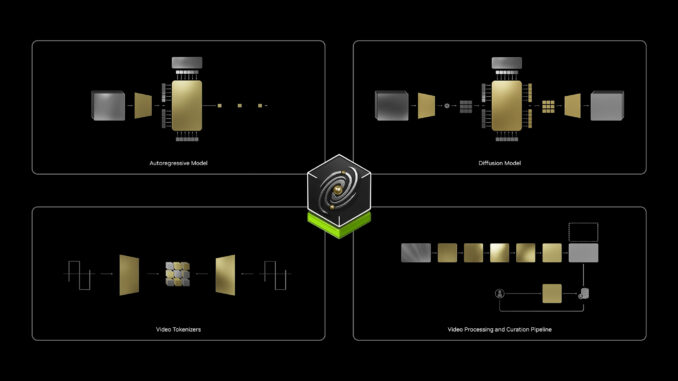
The development of Physical AI—AI systems designed to simulate, predict, and optimize real-world physics—has long been constrained by significant challenges. Building accurate models often demands extensive computational resources and time, with simulations sometimes requiring days or weeks to produce actionable results. Additionally, the complexity of scaling these systems for practical use across industries such as manufacturing, healthcare, and robotics has further hindered their widespread adoption. These challenges underscore the need for tools that simplify model development while delivering efficiency and precision.
NVIDIA has introduced the Cosmos World Foundation Model Platform to address these challenges head-on. This platform offers a unified framework that integrates advanced AI models, computational tools, and user-friendly features, all designed to streamline the development, simulation, and deployment of physical AI systems. It is fully optimized to work within NVIDIA’s existing AI and GPU ecosystem, ensuring compatibility and scalability.
Cosmos features pre-trained foundation models capable of simulating intricate physical processes, leveraging NVIDIA’s state-of-the-art GPUs for high-performance computing. The platform is designed with accessibility in mind, providing tools for researchers and developers to build and test models efficiently. It supports critical applications across fields such as climate modeling, autonomous systems, and materials science, bridging the gap between research advancements and practical implementation.
Technical Details and Benefits of the Cosmos Platform
At its core, Cosmos utilizes pre-trained models that have been trained on extensive datasets encompassing diverse physical phenomena. These models incorporate NVIDIA’s latest advancements in transformer architectures and high-scale training, enabling them to generalize across various domains with high accuracy. The platform integrates with NVIDIA’s proprietary tools, such as CUDA-X AI and Omniverse, ensuring seamless workflow compatibility.
One of Cosmos’ key features is its real-time simulation capability, powered by NVIDIA’s GPUs. This significantly reduces the time required for iterative design and testing, making the platform especially valuable for industries such as automotive engineering. The modular architecture of Cosmos allows it to be integrated into existing workflows without requiring extensive modifications, further enhancing its usability.
The platform also prioritizes model transparency and reliability. Through visualization tools, users can better understand and validate predictions, fostering trust in the results. Collaborative features enable multidisciplinary teams to work together effectively, an essential capability for addressing complex, cross-disciplinary challenges.
Conclusion
NVIDIA’s Cosmos World Foundation Model Platform offers a practical and robust solution to many of the challenges faced in physical AI development. By combining advanced technology with a user-focused design, Cosmos supports efficient and accurate model development, fostering innovation across various fields. The platform’s ability to deliver real-world results—such as improved energy efficiency and faster simulation times—highlights its potential to transform industries. With Cosmos, NVIDIA is advancing the capabilities of physical AI, making it more accessible and impactful for researchers and practitioners alike.
Check out the Details here. All credit for this research goes to the researchers of this project. Also, don’t forget to follow us on Twitter and join our Telegram Channel and LinkedIn Group. Don’t Forget to join our 60k+ ML SubReddit.
🚨 FREE UPCOMING AI WEBINAR (JAN 15, 2025): Boost LLM Accuracy with Synthetic Data and Evaluation Intelligence–Join this webinar to gain actionable insights into boosting LLM model performance and accuracy while safeguarding data privacy.
Aswin AK is a consulting intern at MarkTechPost. He is pursuing his Dual Degree at the Indian Institute of Technology, Kharagpur. He is passionate about data science and machine learning, bringing a strong academic background and hands-on experience in solving real-life cross-domain challenges.





Be the first to comment